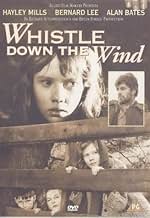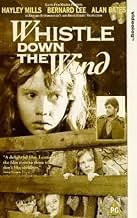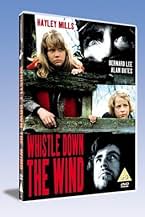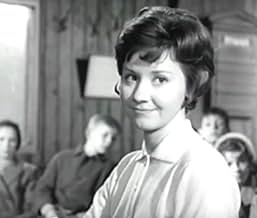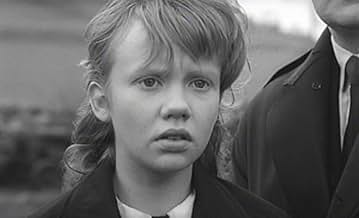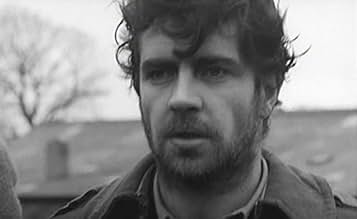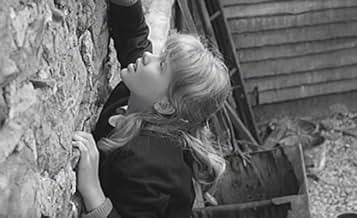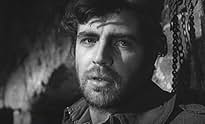VALUTAZIONE IMDb
7,6/10
3993
LA TUA VALUTAZIONE
Aggiungi una trama nella tua linguaWhen an injured wife murderer takes refuge on a remote Lancashire farm, the owner's three children mistakenly believe him to be the Second Coming of Christ.When an injured wife murderer takes refuge on a remote Lancashire farm, the owner's three children mistakenly believe him to be the Second Coming of Christ.When an injured wife murderer takes refuge on a remote Lancashire farm, the owner's three children mistakenly believe him to be the Second Coming of Christ.
- Regia
- Sceneggiatura
- Star
- Nominato ai 4 BAFTA Award
- 1 vittoria e 5 candidature totali
Recensioni in evidenza
Beautifully photographed in black and white this film should be considered a MASTERPIECE! Haley Millsgives the performance of her career (maybe next to"Tiger Bay) as Cathy. Alan Bates is also excellent! It is real shame that these classic films do not get airplay on cable.
Hayley Mills excels in this understated, underrated movie juxtaposing the sordid criminal world (Alan Bates as a murderer on the run) with the innocence of children. Cleverly designed, perfectly acted (by all the children as well as the adults), pithily appropriate screenplay, believable accents (the setting is the Yorkshire moors in England), and a well-balanced, carefully planned production all combine to produce a mesmerising gem of a film. Already a star, Hayley Mills proved she was not just a pretty face and built on her impressive performance in Tiger Bay to create a moving character of budding adolescence, still trapped in childhood innocence and belief. The period of the early sixties is neatly conveyed, and Hayley Mills as Cathy creates a metaphor for the deeper layer of the film's message of the increasing social awareness and diminishing religious belief (despite the traditional Sunday School attitudes and practices) which was gradually bringing about the social change of Britain in the sixties. The story is well told, the drama is dynamic, the actors do a marvellous job and the film certainly deserves to be better known, if not least because it's an early example of Richard Attenborough's production skills.
One of my favourite english films. Beautifully portraying rural Lancashire life in the sixties. The story is touching and marvellously played by all the children involved. One of the few films that can bring a tear to my eye, maybe because it reminds me of the child I once was in the sixties, but probably because it is a moving film and I suspect it would have the same affect on a native New Yorker. One of those old classics that if you haven't seen yet, you will be pleasantly surprised when you get round to it. You can take it as recommended!
Once in a while you come across a film that is perfect - and this film is one of them. It has everything - humour, pathos, skilled acting, beautiful cinematography and it deals with the deepest questions of human existence. I found myself alternating between laughter and tears. It seems to touch on deep themes which films rarely dare to nowadays - themes of belief, faith, and the meaning of love.
The photography of the bleak Lancashire countryside is superbly crisp, the facial expressions of the actors (especially Mr Bates) let us know exactly what is going on in their minds but subtly, in a way that is never seen nowadays in films where everything must be made explicit.The children interact entirely naturally and they are not merely credulous, but curious and questioning ('he's not Jesus, he's just some fella'). Some scenes are deeply moving, in particular when the children dance under a tree to the music of 'We Three Kings' in joy and praise at seeing what they believe to be their Saviour - seeming to sum up the deep, almost pagan connection between religion and the English countryside.
The film deftly deals with the changing England of the time. By the early sixties, mainstream Christianity had begun to lose its hold on the English people (this was the time of Bishop Robinson and the 'Honest to God' debate); the decaying, plundered church is representative of the decline in organised religion, juxtaposed with the 'true' faith of the children. The religious figures, however, are not pilloried as would be the case in most modern films - they are treated sympathetically. I particularly liked the look of awkwardness on the Sunday school teacher's face when she is asked a question about Jesus which she knows she cannot answer with any honesty, and which she clumsily sidesteps.
In many ways the film is an elegy for a lost England - an England where children roam the countryside freely, where the nearest telephone is half a mile away, and where children live in relative material poverty but with strong familial love, where the simple pleasures of life are enjoyed - playing in the open air, having a birthday party at home, or reading late into the night. The film could not realistically have been made even just ten years later.
The photography of the bleak Lancashire countryside is superbly crisp, the facial expressions of the actors (especially Mr Bates) let us know exactly what is going on in their minds but subtly, in a way that is never seen nowadays in films where everything must be made explicit.The children interact entirely naturally and they are not merely credulous, but curious and questioning ('he's not Jesus, he's just some fella'). Some scenes are deeply moving, in particular when the children dance under a tree to the music of 'We Three Kings' in joy and praise at seeing what they believe to be their Saviour - seeming to sum up the deep, almost pagan connection between religion and the English countryside.
The film deftly deals with the changing England of the time. By the early sixties, mainstream Christianity had begun to lose its hold on the English people (this was the time of Bishop Robinson and the 'Honest to God' debate); the decaying, plundered church is representative of the decline in organised religion, juxtaposed with the 'true' faith of the children. The religious figures, however, are not pilloried as would be the case in most modern films - they are treated sympathetically. I particularly liked the look of awkwardness on the Sunday school teacher's face when she is asked a question about Jesus which she knows she cannot answer with any honesty, and which she clumsily sidesteps.
In many ways the film is an elegy for a lost England - an England where children roam the countryside freely, where the nearest telephone is half a mile away, and where children live in relative material poverty but with strong familial love, where the simple pleasures of life are enjoyed - playing in the open air, having a birthday party at home, or reading late into the night. The film could not realistically have been made even just ten years later.
Whistle Down the Wind has remained one of my favourite films ever since I saw it as a young child many years ago when my parents took me to see it when it was originally released. The performances by all the children in the film are charming and Alan Bates excels as the criminal who is mistaken for Jesus. For me, the special aspects of the film are its genuine innocence and the capturing of a much simpler time in England that will never return. I myself was born and grew up in the north in an area similar to the one shown in the film and today, now aged 48, watch the film with great nostalgia and a warm feeling about my carefree life as a child. I also feel sadness that many children in our country today cannot enjoy the freedom to roam and play far and wide as I (and the children in the film) could do at that time. I have never met anyone who didn't enjoy this underrated classic and defy anyone not to be moved by the naturalness of the performances. A marvelous addition to anyone's DVD collection and one that I treasure.
Lo sapevi?
- QuizThe title "Whistle Down the Wind" originally comes from falconry and means "to let a falcon fly away free."
- BlooperIn several scenes, but especially when the children are in the barn discussing a name for the cats, the youngest boy can be seen mouthing the other characters lines before he says his own.
- Citazioni
Charlie Bostock: It isn't Jesus. It's just a fella.
- Curiosità sui creditiThe character played by Alan Bates is named Arthur Alan Blakey in the movie, but in the credits he is listed as "The Man."
- ConnessioniFeatured in Blue Peter: Episodio #4.32 (1961)
- Colonne sonoreWe Three Kings
(uncredited)
Words and Music by John H. Hopkins (as Reverend John Henry Hopkins,, Jr.)
Incorporated into incidental music
I più visti
Accedi per valutare e creare un elenco di titoli salvati per ottenere consigli personalizzati
- How long is Whistle Down the Wind?Powered by Alexa
Dettagli
- Data di uscita
- Paese di origine
- Lingua
- Celebre anche come
- ...woher der Wind weht
- Luoghi delle riprese
- Aziende produttrici
- Vedi altri crediti dell’azienda su IMDbPro
Botteghino
- Budget
- 148.000 £ (previsto)
- Tempo di esecuzione
- 1h 39min(99 min)
- Colore
- Proporzioni
- 1.66 : 1
Contribuisci a questa pagina
Suggerisci una modifica o aggiungi i contenuti mancanti

